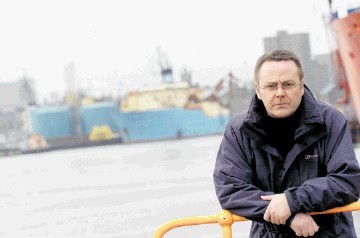
All this week Energy Voice is taking a look back at the events of November 6th in which 45 men lost their lives after a Chinook helicopter crashed on its return to Sumburgh Airport from the Brent Delta platform.
Here, RMT regional organiser Jake Molloy tells of his experience in the wake of the helicopter accident, and the impact it had on his life, families, workers and the industry as a whole.
On November 6th 1986 when the Chinook took the lives of 45 workers I was at home, redundant like many thousands more due to the 1986 downturn.
My son was 5-years old, my daughter just 4-months and we worried about the future. But as I watched the pictures of the Chinook disaster and thought of the 45 families that would never see their loved ones again, I wasn’t that bad off.
Around the 18th of November I got a call from a former employer asking if I was available for offshore work. The rate was a lot lower, but it was work and I jumped at it. On November 20th I landed on Brent Delta with 18 others and got allocated a cabin.
I walked in to find a lad sitting on one of the bunks and asked him which locker I should use. The one he pointed me to had a name on it that I recognised so I asked if he’d made a mistake because I knew this guy Jimmy, I worked with him on my last platform.
The lad said bluntly, “He’s dead, he was killed in the Chinook.” My heart sank as I realised, myself and the others were replacements for those killed. No one thought to tell us that!
The next day I called home, I didn’t think I could stay. However, all the talk in the tea shack was about fighting back and organising a petition to get the Chinooks grounded forever.
I was already questioning fairness and safety offshore after getting dumped with the downturn and seeing others hurt or killed, so I got involved with the campaign.
Everyone was delighted with the news months later that Chinooks would not be used by the industry again. My outlook on life changed.
For nearly two years after I landed on Brent Delta a couple of lads had remained ‘distant’, one of them was the guy I first met on November 20th 1986 in the cabin. But it wasn’t until July 1988 that I discovered why these lads appeared to be ‘loners’.
Piper Alpha had killed 167 and all the talk was about the tragedy and how the families would cope. One nightshift during a quiet tea break the lad I had first met in my cabin said something which explained everything; “I hope their mates don’t have to do what we did.”
I asked what it was he and his workmates did, and he explained a couple of them had been asked to go in and identify the bodies of those killed in the Chinook.
He told me how a temporary morgue had been set up in a hangar at Sumburgh after the accident and that he and a couple of others were asked in to help the authorities in the process of identity to try and ease the pain for the families.
Due to the nature of the accident and the terrible injuries inflicted it had proved difficult to identify some of the poor souls lost.
That experience had clearly had an impact on the lads and it was only now in the wake of another tragedy they felt able to talk about it. There’s no doubt in my mind today they were suffering the effects of Post Traumatic Stress Disorder and it explained why they had seemed ‘distant’. This condition wasn’t recognised until after Piper Alpha.
It goes without saying the Chinook tragedy changed forever the lives of all those who lost loved ones. But it changed and influenced the lives of many others, myself included. The Chinook tragedy and all those affected by it will always be in my thoughts.
Recommended for you
